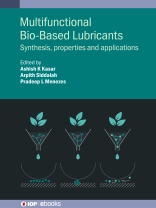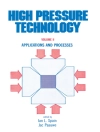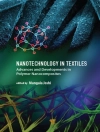There is a critical need for engineers to move away from using conventional petroleum-based oils and lubricants in mechanical systems due to their environmental impact. As the first book dedicated to multifunctional bio-based lubricants, this reference text provides detailed coverage on all aspects of the field, including the need for these lubricants and their performance, the synthesis and design routes, and their valuable multifunctional properties. The environmental benefits and superior properties of these lubricants are covered. With sustainability as a key focus, the book raises awareness of the need to develop bio-based lubricants with a lower environmental footprint than traditional lubricants, covers methods for synthesising lubricants from waste plastics (an emerging technique) and discusses suitable techniques for their eventual disposal.
Key Features
- First research book dedicated to multifunctional bio-based lubricants
- Provides detailed coverage on the performance, synthesis and design of these lubricants
- Covers the environmental benefits and superior properties
- Discusses the future market based on the potential applications
- Covers disposal techniques and methods for synthesising lubricants from waste plastics
Jadual kandungan
1 Synthesis of bio-based lubricants
2 Bio-based lubricants and their environmental sustainability
3 Tribology of multifunctional bio-based lubricants
4 Multiphase bio-lubricants for engine components
5 Machine learning to develop lubrication strategies
6 Environmentally friendly grease
7 Additives for lubricants
8 Environmentally friendly cutting fluids
Mengenai Pengarang
Ashish Kasar received his Ph.D. in Mechanical Engineering from the University of Nevada, Reno. He is working in the field of tribology that specifically includes composites with solid lubricants for severe environmental conditions, and environmentally friendly bio-lubricants such as vegetable oil and ionic liquids. He has published 36 articles in peer-reviewed journals and two book chapters. He has presented his research work at prestigious conferences – Society of Tribologists and Lubrication Engineers (STLE), The Minerals, Metals & Materials Society (TMS) and The Materials Science & Technology (MS&T).
Arpith Siddaiah received his Ph.D. in Mechanical Engineering from the University of Nevada, Reno. His expertise in tribology, surface engineering, CAD/CAM, GD&T, and automated manufacturing has enabled him to be involved in innovative R&D projects and produce 25 research articles, 14 conference publications, and a patent. He is an editor of the book “Tribocorrosion: Fundamentals, Methods, and Materials” and is a reviewer for two reputed research journals.
Pradeep Menezes is an Associate Professor in the Mechanical Engineering Department at the University of Nevada, Reno. He previously worked as an Adjunct Assistant Professor at the University of Wisconsin-Milwaukee and Research Assistant Professor at University of Pittsburgh. His productive research career has produced over 160 peer-reviewed journal publications (citations over 8000, h-index 43), 40 book chapters, eight books and one patent.












